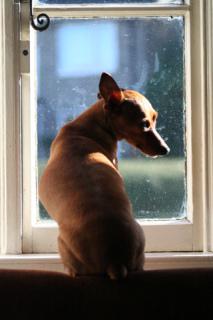 Tender: Image by Fazen, Flickr
Tender: Image by Fazen, FlickrPet separation anxiety is a serious problem that can cause injury to your pet and damage to your home. Keep reading to learn what causes separation anxiety, and some of the symptoms to look out for.
Causes Of Pet Separation Anxiety
Here are some potential causes of separation anxiety in your pet.
Loss Of Mother
Sometimes, when a baby is separated from his mother too soon, he may suffer from separation anxiety. Your pet may assume that when you leave, you're never going to come back.
Traumatic Experience
A traumatic experience in your animal's past, like a previously abusive owner, can sometimes cause separation anxiety. Also, events such as a thunderstorm, earthquake, or fire can trigger separation anxiety to occur.
New Family
A change of guardian or family, being left in a shelter, or being abandoned by an owner can sometimes cause separation anxiety.
New Home
Change of residence has been known to cause separation anxiety as well. Your animal may feel as if he's being left alone in a strange or new environment, which may cause panic and worry.
New Schedule
A change of schedule in work or school can trigger separation anxiety. This might occur when an owner works at home switches to working in an office, a child goes back to school, or a person who normally works a day shift suddenly shifts to working a night shift, for example.
Loss Of A Family Member
The loss of a family member that the animal loved, through moving away or death, can trigger separation anxiety.
Symptoms Of Pet Separation Anxiety
If your pet is doing any of these things, he might be suffering from pet separation anxiety.

Accidents In The Home
Some animals will urinate or defecate when they're left alone. Before jumping to conclusions, keep in mind that there are a number of reasons why your pet might be having accidents. If your pet is doing it regardless of if you're present or gone, it's probably not separation anxiety.
Digging, Chewing, And Destruction
Many animals with separation anxiety, especially dogs, will dig, chew, and destroy things throughout the home. Behaviors such as these can sometimes result in injuries and should be taken care of. If the animal exhibits the same behavior when you're around, the behavior probably has another cause.
Howling And Barking
If you own a dog, he'll probably howl and bark the entire time you're gone if he has separation anxiety. His howling and barking will be persistent, often for the whole time he's left alone.
Pacing
Many animals will pace in a specific path when kept away from their guardian. They might move in straight, or circular patterns depending on the animal.
Escape
When your pet is left alone, he might do anything he possibly can to escape where he's being held, or the home. This can result in digging, chewing, and possible escape.
Consuming Excrement
Some animals might even consume their own excrement when left alone. If they do this while the owner is present, it's probably not a sign of separation anxiety.
If your animal is exhibiting any of these signs while you're not around, he probably has separation anxiety. Do your best to take care of the problem immediately to avoid injury or further damage to the home.
Also Read: 5 Tips To Deal With Pet Separation Anxiety When Kids Go Back To School

